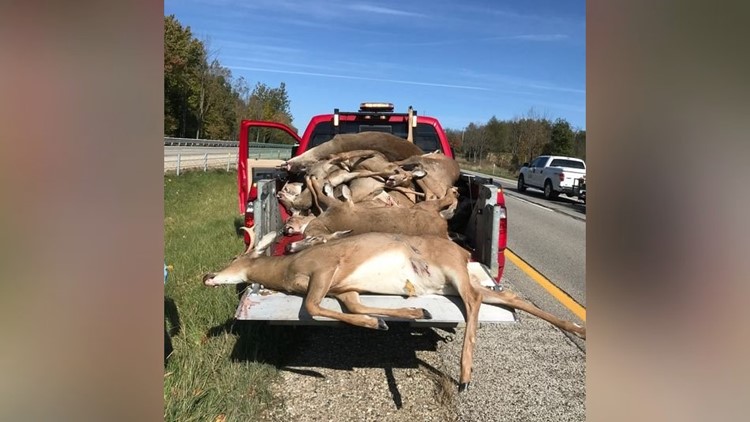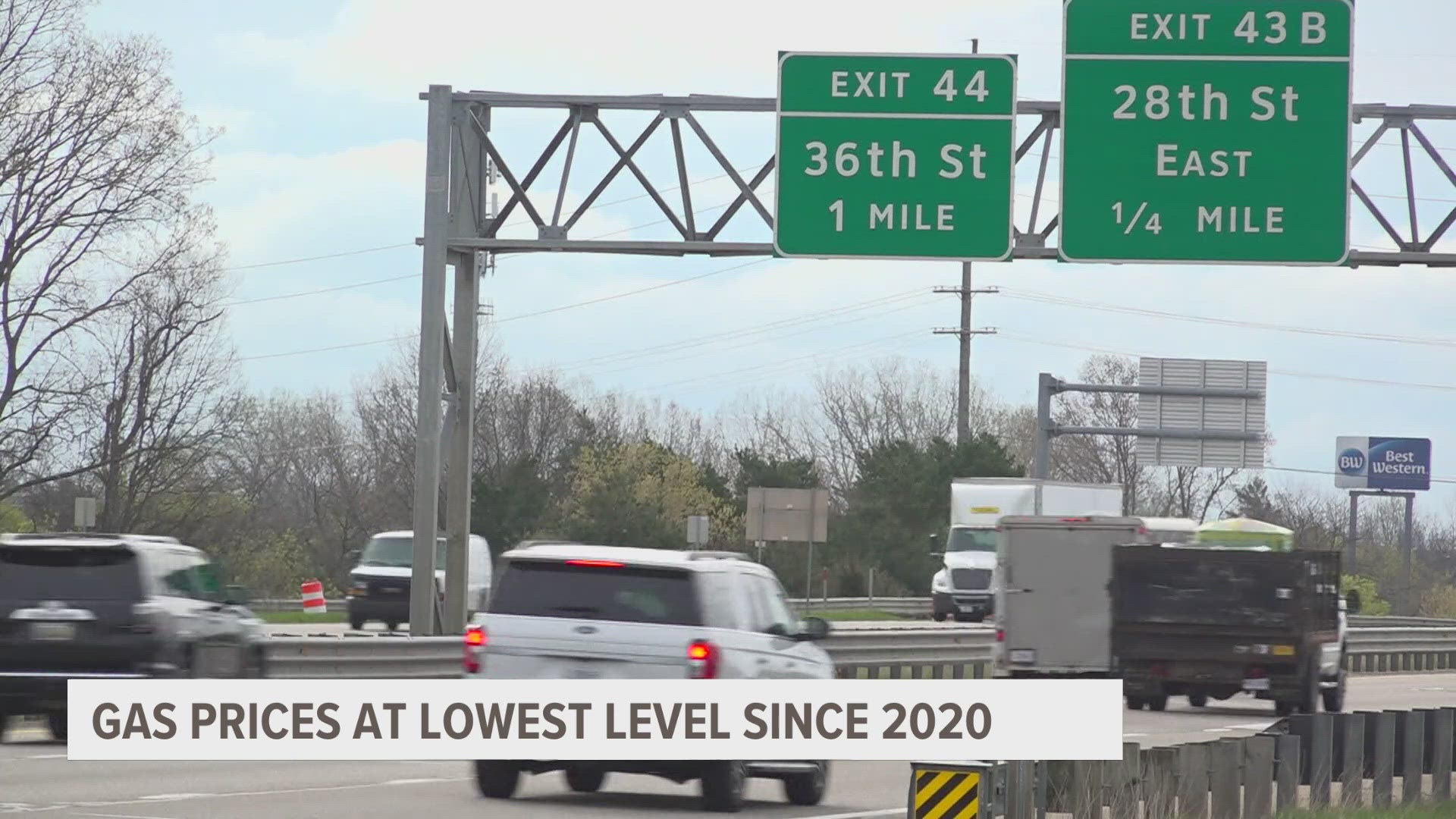Russ Stoddard has seen every kind of reaction from fellow drivers passing the unusual haul in the bed of his red pickup truck.
Some smile, honk and give a hearty thumbs up. Some flash looks of disgust. Some snap pictures on their cellphones.
On any given day in November, Stoddard may be hauling as many as 37 deer carcasses.
"People are amazed by it," he said. "The ones I get are pretty banged up."
Owner of Michigan Highway Hazard Recovery in Capac, Stoddard and his fleet of three trucks are contracted by the Michigan Department of Transportation to remove deer carcasses along Interstates 94 and 69 in nine counties, including Calhoun.
He's in the area at least twice a week during the peak season in November and December, when the bucks are in rut and, in some instances, paying more attention to does than to oncoming traffic.
Calhoun County had 1,017 accidents involving deer in 2017, placing it 13th out of 83 counties, according to Michigan Traffic Crash Facts, a website maintained by the University of Michigan. None were fatal, but that number far exceeds accidents caused by distracted driving (245), drinking (144) or drug use (56) over the same period of time.
A dead buck on the shoulder of the northbound traffic of I-194 in Battle Creek on November 19, 2018. (Photo: Nick Buckley/Battle Creek Enquirer)
Stoddard believes the number of accidents involving deer is actually much higher.
"I would say, 90% of deer I pick up aren't reported," he said. "I saw a deer coming across the road by Marshall, and nobody else saw it. This car hit it. There was plastic flying all over the place, and it never stopped. I think I'd be checking my car. A ton are hit by semis, they don't always report it."
The business of roadkill
While Michigan Highway Hazard Recovery removes deer carcasses along major highways, the carcasses on roads in cities, villages and townships are left for the local county road agencies or private businesses to deal with.
Troy Baxter, owner of Rascal Wildlife Removal Services in Hickory Corners, said he has done "25 to 30 deer carcass removals this November" between Calhoun, Kalamazoo and Barry counties.
"(It's) more so in residential areas with larger undeveloped areas within them and nearby industrial businesses areas with green space around them," Baxter said. "I think it's because there are fewer coyotes and no deer hunters in those areas."
Baxter charges between $135 and $250 for removing a deer carcass, depending on its location, whether he has a contract with a local municipality and how long it's been sitting.
The Calhoun County Road Department used to have a carcass removal program but discontinued it nearly a decade ago due to budget constraints.
"As funding has become tight for all road departments/commissions throughout the state, we decided to move that funding elsewhere," said Lucy Blair, communications specialist for Calhoun County. "However, we want to remove any hazard to the traveling public. If we receive a call that there is a deer in the travel lane, we send someone to remove it. We do not pick up deer on the shoulder of the road."
The County Road Association of Michigan has said it's a legislative priority for 2019 for the state to develop a policy on how to deal with the increasingly costly issue of animal carcass removal on roadways.
They believe the burden should fall on the Michigan Department of Natural Resources and that local agencies that choose to pick up animals from roadways should be reimbursed from money other than dedicated transportation revenues.
Roadkill, it's what's for dinner
The only time the Michigan DNR deals with a deer killed in a traffic accident is for the purpose of consumption.
A state law passed in 2014 requires an individual who takes possession of a deer killed in a crash to obtain a salvage tag by notifying the DNR or a local law enforcement agency via telephone or website or when reporting the accident to 911 in case of a collision with a vehicle. The driver of the vehicle has first choice to take possession of the game. If it's left, another individual can take it for salvage.
People for the Ethical Treatment of Animals is on board with eating roadkill, according to its website, which offers that, "If people must eat animal carcasses, roadkill is a superior option to the neatly shrink-wrapped plastic packages of meat in the supermarket."
However, deer processors have the right to refuse to process animals involved in traffic accidents.
"I don't do roadkill," said Greg Saltzman, owner of Whitetail Farms Farm Fresh Market in Olivet. "If they have the proper documentation, it can be done. They have the right to take it. Sometimes it's really bad. If they're not cleaned out or gutted, I don't want them in my store... I don't even know how long it's been sitting."
The DNR provides check stations, where hunters can drop off the heads of deer carcasses to be tested for chronic wasting disease, a fatal nervous system disease found in deer, moose and elk. Calhoun County falls within the "watch zone" for CWD.
"We have occasionally collected heads from roadkill deer for disease testing, but we are moving away from that practice," said Mark Mills, a DNR wildlife biologist. "We have tested thousands of heads from roadkilled deer and have yet to record a positive for CWD from one."
People are finding other uses for deer carcasses as well, much to Stoddard's displeasure.
"I wish people that come across that deer wouldn't cut the horns off, take the backstraps off, pull it off in the ditch," he said. "It's harder for us to find that deer in a ditch. People cut the horns or head of deer, they use the horns for rattling. People take them for decorations."
Stoddard, a hunter himself, is not one to hold on to keepsakes. But one deer definitely stands out in the many he's encountered since opening his business in 2002.
"This one was still alive, but it's back was broke. State police came and put it down," he said. "But 40 minutes later, I stop for gas, it was still alive. Hit by a car. Shot by a trooper and still alive. It did die before I got to the landfill."
Russ Stoddard, owner of Michigan Highway Hazard Recovery, said this deer was struck by a vehicle and broke it's back, and was later shot by a state trooper, but was still alive. It died on the way to the landfill. (Photo: Courtesy of Russ Stoddard)
2017 deer collisions in Michigan, by county
1. Oakland 1,765
2. Kent 1,572
3. Jackson 1,310
4. Lapeer 1,185
5. Ottawa 1,122
6. Montcalm 1,075
7. Isabella 1,057
8. Huron 1,055
9. Genesee 1,049
10. Allegan 1,044
11. Sanilac 1,034
12. Calhoun 1,017
Source: michigantrafficcrashfacts.org
Nick Buckley can be reached at nbuckley@battlecreekenquirer.com or 269-966-0652. Follow him on Twitter:@NickJBuckley
►Make it easy to keep up to date with more stories like this. Download the 13 ON YOUR SIDE app now.
Have a news tip? Email news@13onyourside.com, visit our Facebook page or Twitter.



